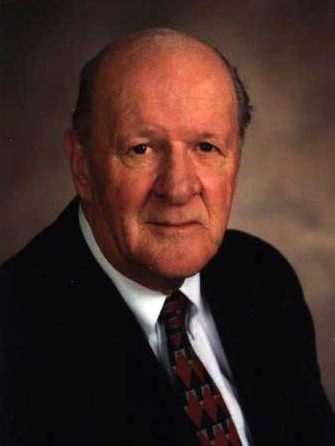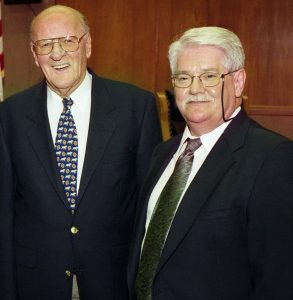
To honor Robert F. Glassman in a way that truly reflects how good a person and lawyer he was is a difficult task. His legal career and personal life paralleled each other in ways not common to human experience. He practiced law as he lived his life: honorably, honestly and happily. His life and career are inspirations for many who have followed him. He truly led by example.
Bob was the son of Florian and Mary Glassman. Bob’s father immigrated from Russia at the age of fifteen and settled in Victoria, Kansas in 1905. Florian married Mary Dreiling, and opened a business in Victoria selling and repairing harnesses and leather goods. They moved to Hays in 1917, and opened a shoe repair shop and operated it for 40 years. Robert F. Glassman was born on February 12, 1922. He died January 21, 2005, just short of his 83rd birthday.
Bob attended St. Joseph’s Parochial School and St. Joseph’s Military Academy, and, after high school, entered the United States Army in October of 1942. After his basic training in Arkansas, he was assigned to Officers Candidate School in Ft. Benning, Georgia, and was commissioned as a Second Lieutenant assigned to the 96th Infantry Division. He took additional amphibious landing training in California and then was transferred to the Pacific Theatre.
When Bob participated in the invasion of Leyte in the Philippine Islands in October of 1944, he was a First Lieutenant platoon leader. For his valor as a soldier in that campaign, he received the Purple Heart, the Silver Star, and the Combat Infantry Badge. Bob’s division then was assigned to the invasion of the island of Okinawa, the last major battle in WWII. The commanding officer of Bob’s company was seriously wounded in action, and Bob became Commanding Officer. During the battle, while he was leading his company into battle, Bob was shot by a sniper. He was being transported to Graves Registration on the hood of a jeep, taken for dead, when the driver of the jeep saw Bob’s lips moving. He was praying. The driver detoured to the hospital and fortunately for Bob—and his family and the community that he came to serve—his life was saved. After surgery and hospitalization until April of 1946, he returned to his home here in Hays, Kansas.
During his hospitalization in Texas, Bob and Mary Frances Leiker married. As a blessing of that marriage, Bob had two daughters, Belinda Hartman and Susan Meyers. He and Mary Frances lost a son, Robert, Jr. two days after he was born.
When Bob returned to Hays, he went to work for the Coca-Cola Bottling Company. He learned that he was entitled to assistance with his education as a result of his military service, and began attending college at Fort Hays State University. The GI Bill provided that Bob was entitled to four years of college and a law school education, but in order to get a law school degree one had to have four years of college and three years of law school, and so Bob’s Veteran’s Advisor and he worked out a plan which allowed him to take a full load of classes fall, spring, and summer for two years at Fort Hays State and another two years at Washburn to get a law degree. At the end of his two years of college in Hays, he was four hours short of his required courses to get his degree, and arranged to take a class long-distance, which he completed while he was completing law school, so he graduated from college in May of 1950 and received his law degree in September of 1950.
 With a wife and children, Bob knew that he needed immediate employment after he received his law degree. He wanted to come back home and run for County Attorney, but Norbert Dreiling had already filed as a Democrat for that office, and Bob, a life-long Democrat, knew that running against another good Democrat like that would not be the wise thing. The office of Probate Judge was open, and Bob filed for it. Another person filed for the office, and despite not being able to come back and campaign for himself, with the help of his friends and family Bob was elected and held the position of Probate Judge here in Ellis County for eight years. He then ran for County Attorney and served in that office for two years. Bob left the County Attorney’s office and set up private practice in Hays. His first office was in the Wasinger building on 12th Street, but after a few months he had a chance to buy the nearby Basgall Grocery Store building, which was vacant. The Basgall family was kind enough to sell the building to him on contract, and he had an office at 113 West 13th until 2003. At that time Bob and his partners moved into their new offices at 200 West 13th, a remodeled church building, of which he was especially proud. Bob served as the City of Hays Attorney for a period of 25 years from 1962 until 1987. In 1975, John T. Bird joined him in the practice of law, and in 1981, he took in Glenn R. Braun, and in 2000, Gregory A. Schwartz.
With a wife and children, Bob knew that he needed immediate employment after he received his law degree. He wanted to come back home and run for County Attorney, but Norbert Dreiling had already filed as a Democrat for that office, and Bob, a life-long Democrat, knew that running against another good Democrat like that would not be the wise thing. The office of Probate Judge was open, and Bob filed for it. Another person filed for the office, and despite not being able to come back and campaign for himself, with the help of his friends and family Bob was elected and held the position of Probate Judge here in Ellis County for eight years. He then ran for County Attorney and served in that office for two years. Bob left the County Attorney’s office and set up private practice in Hays. His first office was in the Wasinger building on 12th Street, but after a few months he had a chance to buy the nearby Basgall Grocery Store building, which was vacant. The Basgall family was kind enough to sell the building to him on contract, and he had an office at 113 West 13th until 2003. At that time Bob and his partners moved into their new offices at 200 West 13th, a remodeled church building, of which he was especially proud. Bob served as the City of Hays Attorney for a period of 25 years from 1962 until 1987. In 1975, John T. Bird joined him in the practice of law, and in 1981, he took in Glenn R. Braun, and in 2000, Gregory A. Schwartz.
Bob’s life was one of deep involvement in his community. He served as the Chairman of the Fund Drive for St. Anthony’s Hospital Special Gifts Section, when that hospital was first being constructed. He was President of the St. Anthony’s Hospital Advisory Board, and participated in many other activities regarding fund-raising for the hospital. He was a key person in the Fund Drive for the Rectory of St. Fidelis Church in Victoria, Kansas, served as past President of the St. Joseph’s Parish Council in Hays, was a member of the Fourth Degree in the Knights of Columbus, and was an Honorary Member of the Capuchin Order.
His political involvement was constant and long. He served in many offices in the Democratic Party, and was proud to have been an alternate delegate to the National Convention in Los Angeles which nominated John F. Kennedy for President in 1960. He was a Commander and a life member of the Veteran of Foreign Wars Post #9076, a life member of the American Legion, a member of the American Disabled Veterans, and was active in reunions of his military unit.
Many of the other important things about Bob Glassman don’t appear in the law books or on certificates hanging on walls. Only his family and close friends know of the generosity that Bob Glassman demonstrated throughout his entire life. He was a substantial donor to numerous charitable and religious activities, and always turned down the opportunity to be publicly honored or recognized for that activity. He personified and exemplified the teachings of Matthew: “But when you give to charity, do not let your left hand know what your right hand is doing.” His good works were always performed for the essence of their goodness, not for personal gain or recognition, and that is a lesson he taught those around him. Nothing could demonstrate the strength of his philosophy of life better than what happened in Bob’s last days of life. When Bob was diagnosed with melanoma, a particularly virulent type of cancer, he was referred to the Veterans Administration Hospital in Wichita, where he learned that a new treatment was available. It would involve 52 weeks of injections and had proven successful in other cases. Bob was going to submit to the treatment, but one day called his partner into his office to tell him that he had learned that the cost to the government of the treatments was going to be $2,000 per injection. Bob pointed out that the total cost would be more than $100,000. His partner replied that it was a benefit he had earned with his military service. Bob told his partner that he had thought it over, that he was nearly 83 years old, that there were undoubtedly younger veterans who needed costly medical treatment, and that he had decided not to put the VA to the added expense for him and it could use that money to help others who could use it more. He died about two months later.
Robert F. Glassman’s service to his community, his profession, and his family are literally indescribably influential. His approach to the practice of law and problem-solving on behalf of his clients was that he would attempt to leave every situation better than he found it, and he succeeded. Not only did he succeed, but he served as an example to other lawyers to behave in the same fashion. Despite his age and his obvious ability to do whatever he pleased, Bob continued to attend to his profession, daily, and his clients were fortunate to continue to have him available to continue giving that sage advice. He came to the office every day until his illness prevented it, only a month before he died, and even then insisted on working on files at home.
Bob Glassman’s good works as a lawyer and citizen continue to benefit his community. His charitable donations funded many of the causes most important to him; his law firm continues to represent clients of all types and kinds; his family carries forward in his faith in his fellow persons; his good lives on.


